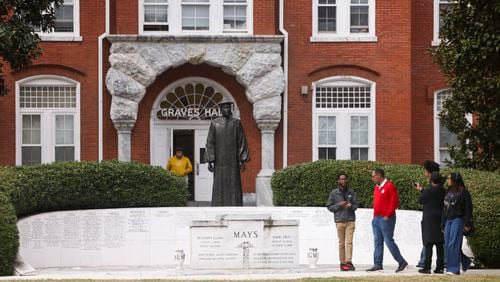Millennials, many like to say, are key to the future of public transportation. They say young people are shunning the car-centric, suburban existence of previous generations. They say this younger generation wants to live in well-connected cities with a suite of mobility options — trains, buses, bike lanes, pathways and good sidewalks.
Uusally, older people make these claims about millennials, citing various statistics and things like “walkability” studies. But where are the millennials themselves who actually want these things?
Look no further than the MARTA Army, a new grassroots volunteer organization hatched by twenty-somethings who want to elevate the public transportation network by combining roll-up-your-sleeves labor and online networking.
One night last month, a group of about 30 MARTA Army “soldiers” gathered at Joystick Gamebar, a pinball and video emporium on Edgewood Avenue. “We want world-class transportation and that’s why we’re here,” says army co-founder Simon Berrebi, 26, a Ph.D student at Georgia Tech, who led the meeting.
The army’s first effort is an adopt-a-bus stop program called “Timely Trip,” which calls for volunteers to attach laminated schedules to poles at bus stops around metro Atlanta, and change them out when schedules change. As of mid-November, about 170 stops had been adopted, but there’s more work to do: MARTA has between 9,000 and 10,000 bus stops, Berrebi says. The army currently numbers about 150 volunteers.
What can a small gesture like sticking signs to bus-stop poles accomplish?
Let a millennial explain: “Transit often gets under-presented,” says MARTA Army co-founder Harshath Jr., a 26-year-old product designer with a master’s degree from Georgia Tech and who uses only one name. “In a city like Atlanta, most of your bus stops are simply a pole with a small MARTA flag in the corner. It’s not noticeable. It’s not very informative. It doesn’t speak back to you. It’s an inanimate object. It blends into the surrounding. With adopt-a-stop, we want to bring transit to life, and have transit speak back to you, make it more informational. Make it respect your needs.
“The second part of it is, when people feel ownership in the system, they feel vested in its improvement. They feel more a part of it. Statements like ‘Our community does not need transit’ are much harder to make when your community is involved in transit and it’s visible. It’s harder to get away with these misrepresentations when it’s obviously clear that your community wants transit. It elevates the conversation to a different level.”
Berrebi, who studies public transportation at Tech, says the adopt-a-stop program sends a constructive message beyond the functionality of the laminated signs, which contain scheduling information, a QR code (a kind of barcode) for real-time information, and the name of the person who adopted the stop. “If you get one or two people to adopt a stop that isn’t used much, that is a very powerful message because all of a sudden this bus stop becomes a gateway; it becomes a place, a destination.” And so you’re empowering that volunteer to become a super-user, who will then be able to do much more than adopt a bus stop.”
Although the MARTA Army has the transit agency’s blessing — MARTA communications reps mingled with soldiers at the November meeting — Berrebi says it’s an independent group that depends on crowdfunding for donations.
“We don’t take any money (from MARTA),” he says. “We’re creative. We’re good with technology.” “And we want to help. In six weeks, we haven’t seen a single roadblock. We’ve been absolutely overwhelmed with people’s requests to join and to help us. We get so many requests for signs we can’t fulfill them all. We run out of laminating film at almost every event.”
MARTA is also taking a leap with the army, Berrebi says. “We don’t have very good bus stops in Atlanta, but we have a transit agency that is letting random people go and adopt these stops and put up signs at their bus stops. And that’s real risk-taking. That’s cutting edge and that’s what makes MARTA a first-tier transit agency. By allowing us to do this, they are pushing themselves to become more innovative.”
The army’s next initiative is an employee-appreciation program called “Kudos,” designed to recognize MARTA workers who go out of their way for customers. Winners will receive a $50 Amazon gift card.
The MARTA Army (www.martaarmy.org; @MARTAarmy on Twitter) will meet next Monday at Mother, a restaurant-bar at 447 Edgewood Avenue SE.
The army may be millennial-driven, but anyone of any age can join.( The youngest soldier is nine years old, but she adopted a bus stop with her parents.)
“We’re trying to show that people care about MARTA,” Berrebi says. “We’re going to make signs. Let’s move Atlanta.”
About the Author





